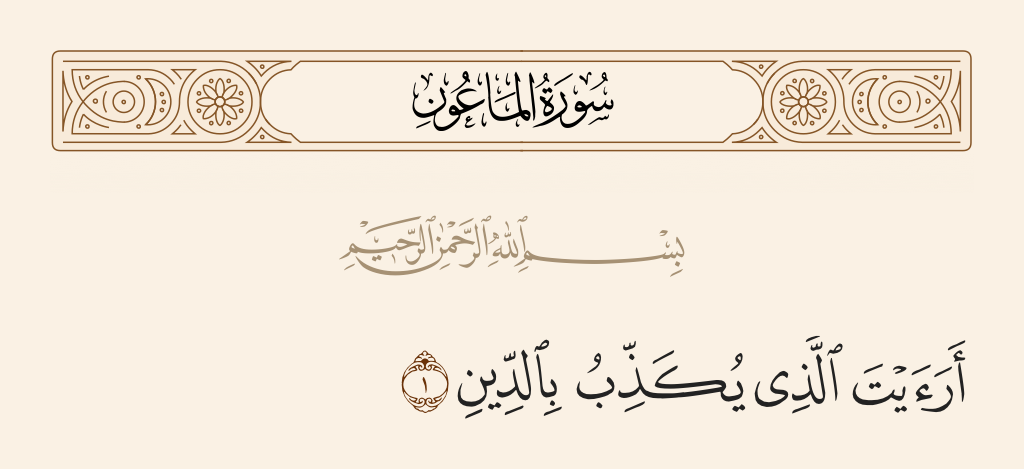Surat Al-Ma‘un Verse No. 1: Reading and listening
Translation of the verse 1 from Surah Al-Ma‘un : Number of verses 7 - - page 602 - Part 30.

﴾أَرَءَيۡتَ ٱلَّذِي يُكَذِّبُ بِٱلدِّينِ ﴿
[ الماعون: 1]
Have you seen him who denies the Recompense?
English - Sahih International
Have you seen the one who denies the Recompense?
Tafheem-ul-Quran by Syed Abu-al-A'la Maududi
(107:1) Did you see him *1 who gives the lie to the Reward and Punishment *2 of the Hereafter? *3
Tafheem-ul-Quran by Syed Abu-al-A'la Maududi
*1) The words "have you seen", apparently, are directed to the Holy Prophet (upon whom be peace), but the Qur'anic style is that on such occasions it generally addresses every intelligent and thinking person. And "seeing" means seeing with the eyes, for what has been described in the succeeding verses can be seen by every seer with his eyes, as well as knowing, understanding and considering something deeply. If the word ara'aita is taken in the second meaning, the verse would mean: "Do you know the kind of man who belies the rewards and punishments." Or: "Have you considered the state of the person who belies the Judgment?
*2) The word ad-din as Qur'anic term is used for the rewards and punishments of the Hereafter as .well as for the religion of Islam. But the theme that . follows is more relevant to the first meaning, although the second meaning also is not out of the context: Ibn 'Abbas has preferred the second meaning, while a majority of the commentators have preferred the first. In case the first meaning is taken, the theme of the Surah would mean that denial of the Hereafter produces such and such a character in man; in case the second meaning is taken, the object of the Surah would be to highlight the moral importance of Islam, to stress that Islam aims at producing an altogether different character in its adherents from that found in its deniers.
*3) The style shows that the object of asking this question at the outset is not to ask whether he has seen the person or not, but to invite the listener to consider as to what kind of character is' produced in man when he denies the judgement of the Hereafter, and to urge him to know the kind of the people who belie this creed so that he tries to understand the moral significance of belief in the Hereafter.
Source : Al-Ma‘un Verse 1: Have you seen the one who denies the Recompense?